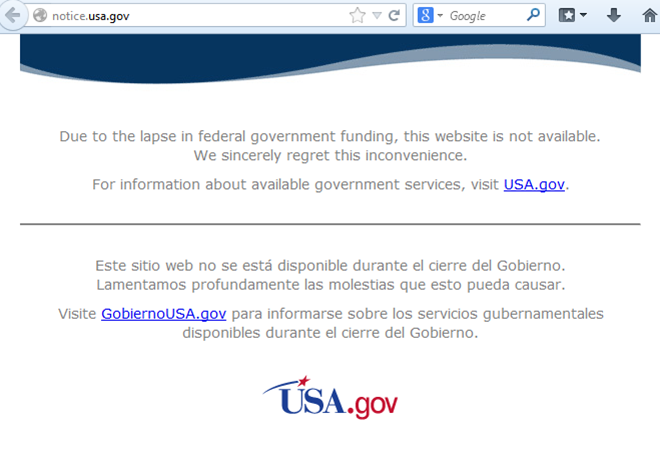Since the start of the government shutdown, my Facebook feed has been filled with nothing but politics. Everyone has an opinion about what is going on and who is responsible. This response was of course expected, but what surprised me was that almost immediately, intertwined with the political commentary, was a flurry of distressed posts from my scientist friends. “Ack! I can’t reach this dataset that was hosted on a government website, how can I do my research?” and “the NSF’s website is down, how can I apply for that grant?” became common themes throughout the day.
Being in a non-profit working on science education, I felt a little smug. While all of my friends in government labs were forbidden to work, leaving Petri dishes to mold over and experiments to end, I could keep chugging along on my projects. This government shutdown was not going to affect me at all. I kept working all through yesterday, writing up and editing materials for a new teacher resource we are developing with the UC Museum of Paleontology. Then I needed a little piece of information, a good resource explaining how isotopes can be used to measure paleoclimates. This was not a problem; I had previously found a good description on NASA’s website. I even had written down the Internet address. But typing the URL for the same page I’d visited ten times before gave me an error.
“That’s strange,” I thought, “Maybe my Internet connection is having problems.” But of course the Internet wasn’t the problem. The NASA website was down, and still is. So are the websites for the USDA, NOAA, the US Forest Service, and the National Science Foundation. This, I realized, was probably not such a great thing for teachers who rely on these resources for their course materials.
 So I sent an e-mail to my teacher friends: had anyone else been thwarted by the shutdown? The emails started piling up: “yes”, “yes,” and “yes”.
So I sent an e-mail to my teacher friends: had anyone else been thwarted by the shutdown? The emails started piling up: “yes”, “yes,” and “yes”.
All public data and resources disappeared overnight, leaving teachers with empty hands as they entered the classroom the next day. Plans for educational grants were halted as deadlines and information vanished from their online repositories. Field trips to national parks that were scheduled and paid for six months in advance were canceled. Speakers evaporated. Professional development was diverted. Buildings were abandoned. Programs, meetings, calls, and workshops were canceled.
One educator came into a facility normally bustling with federal personnel to find a deserted lab with leaking fish tanks. Another had a two-week lesson plan and major lab surrounding a field trip to a national seashore, which was canceled at the last minute, leaving her scrambling for a replacement. A federal scientist told me he had to cancel his high school mentoring during the shutdown since students were not allowed at his place of employment.
The tools that educators have long relied on suddenly evaporated into thin air overnight.
Education may not be the topic people are focused most on when it comes to the government shutdown, but there is no question that it has been greatly impacted. Educators rely on our federal agencies for vetted classroom materials, professional resources, and even one-on-one time with practicing scientists.
If you are an educator being affected by the shutdown, how are you managing? What changes did you have to make to your classroom activities?

